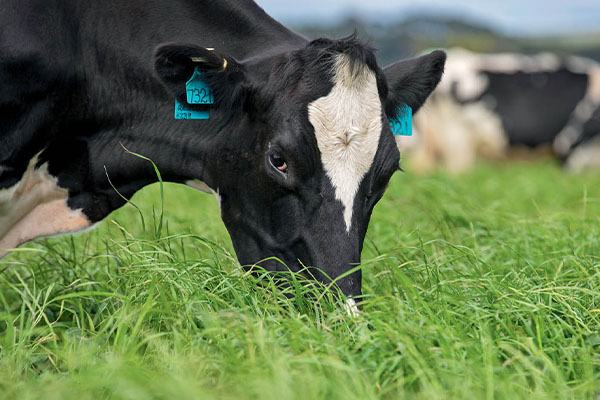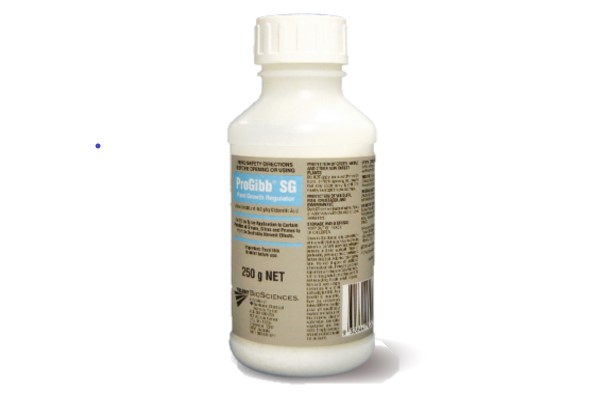Winter pasture feed gap filler ProGibb Smartgrass (SG) began life as a plant growth regulator in Australian table grapes. It was the accidental discovery of its success in pasture management some 20 years ago that opened a global market for agricultural solutions supplier Sumitomo Chemical.

Today, ProGibb SG is a firm fixture for dairy farmers throughout Australia’s temperate pasture zones who rely on it to improve winter pastures when growth naturally slows during cool weather.
Sumitomo Chemical Australia’s regional manager northern New South Wales and New Zealand, Phil Glover said ProGibb SG contained the natural plant growth regulator gibberellic acid. This naturally occurs in pastures such as perennial rye grass, phalaris, cocksfoot, lucerne and annual rye grass, but levels are much reduced in the cold winter months. Boosting gibberellic acid levels in the plants with an application of ProGibb SG therefore significantly increases pasture growth.
“Pasture depletion during winter and cold soil temperatures affect farm income as a consequence of increased costs caused by supplementary feeding,” Phil said.
“However, ProGibb SG can significantly reduce the reliance on and cost of supplementary feeding. Comparatively, it’s an affordable and easy to use option.”
He urged farmers to order supplies now ahead of using ProGibb SG from June-August to provide quality feed for milk production.
“ProGibb SG contains a high concentration of gibberellic acid formulated as a low dose water soluble granular formulation for easy application,” Phil said.
“It boosts plant growth in winter-dormant grasses by stimulating cell expansion, resulting in leaf and stem elongation and rapid foliage growth.
“Moisture and fertiliser are critical to its performance and trials show that the consistent use of ProGibb SG in conjunction with a nitrogen-based fertiliser such as Easy N results in complementary and additive growth responses. Another benefit is that it’s compatible with insecticides and most herbicides so farmers can do two or three jobs at a time.
“The time to apply ProGibb SG is within a day or two after grazing. A single low application, well below the cost of a little bail of hay ($20/ha) can generate an improvement in dry matter production up to 60 per cent in about three weeks. However, significant results can be achieved if it’s used via multiple applications. We know of some farmers using it consistently two or three times a season on the same paddock, depending on how cold it is.
“Farmers wouldn’t keep using it if it wasn’t any good.
“Between 1500kg and 2500kg of good quality dry matter per hectare is the ideal pasture quantity to ensure optimum animal production. The result is a significant increase in milk production and the same quality of milk and there’s also an improvement in cattle health.”
Sumitomo Chemical Australia recommended using 20g/ha for most pastures and 10g/ha for phalaris which was particularly responsive.
Phil said grazing rotation could also be reduced from 30 days to 18 days with ProGibb SG in the mix, maximising productivity time.
ProGibb SG had been used successfully in Australian table grape production and other horticultural crops such as citrus and stone fruits for about 40 years until it was applied to pasture management in a research and development phase two decades ago. As well as dairies, it is now widely used in high-density grazing such as sheep lambing and beef fattening paddocks.
“Based on its positive outcomes in Australia, ProGibb SG is now used in New Zealand, England and parts of Europe,” Phil said.
This article was written by Sumitomo Chemical Australia for Seasons magazine.
Disclaimer - important, please read:
The information contained in this article is given for general information purposes only, current at the time of first publication, and does not constitute professional advice. The article has been independently created by a human author using some degree of creativity through consultation with various third-party sources. Third party information has been sourced from means which Elders consider to be reliable. However, Elders has not independently verified the information and cannot guarantee its accuracy. Links or references to third party sources are provided for convenience only and do not constitute endorsement of material by third parties or any associated product or service offering. While Elders has exercised reasonable care, skill and diligence in preparation of this article, many factors including environmental/seasonal factors and market conditions can impact its accuracy and currency. The information should not be relied upon under any circumstances and, to the extent permitted by law, Elders disclaim liability for any loss or damage arising out of any reliance upon the information contained in this article. If you would like to speak to someone for tailored advice specific to your circumstances relating to any of the matters referred to in this article, please contact Elders.
